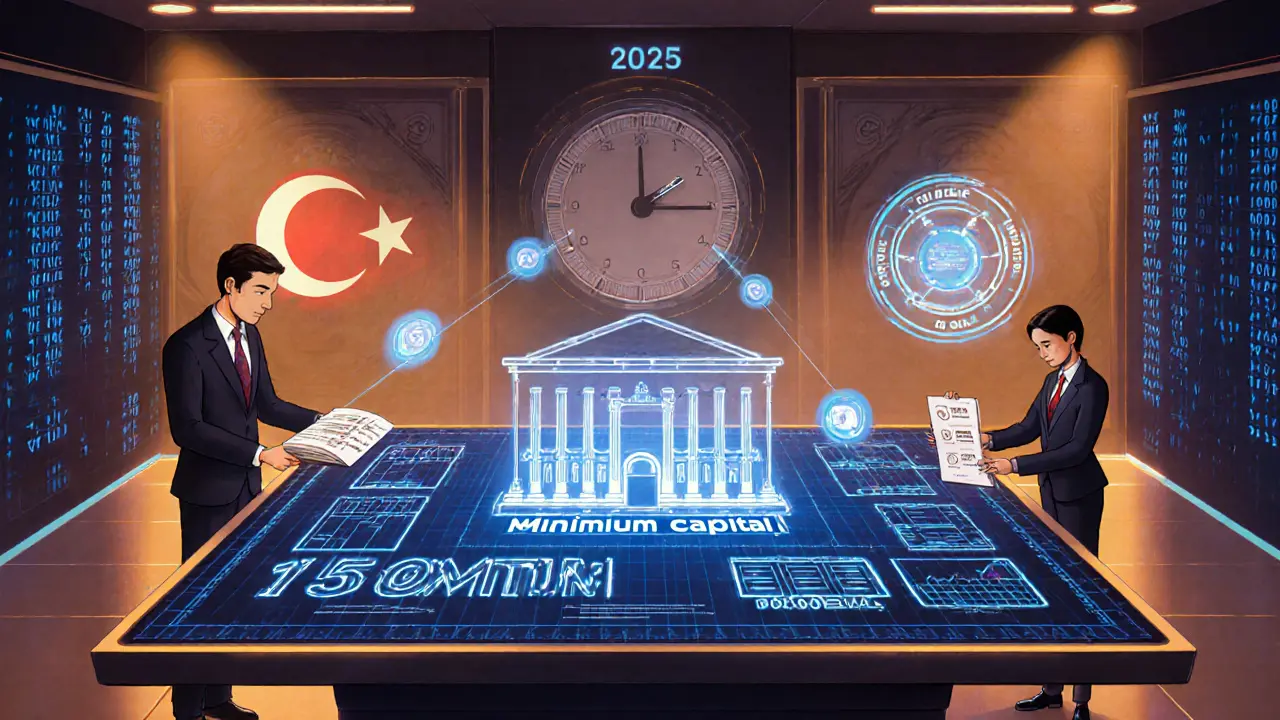Turkey Central Bank cryptocurrency restrictions 2025: What you need to know
 Oct, 9 2025
Oct, 9 2025
Turkey Crypto Licensing Requirements Calculator
Check Your Eligibility
Calculate if your capital meets Turkey's minimum requirements for licensed crypto exchanges or custodians.
Central Bank of the Republic of Turkey (CBRT) is the chief monetary authority that has drawn a hard line around crypto payments while still allowing trading and investment. In plain English, you can buy, sell or hold Bitcoin and other tokens, but you cannot use them to pay for a pizza, a taxi, or a house without first converting them to Turkish Lira through a licensed exchange.
What the CBRT’s crypto ban actually means
The ban was first introduced in April 2021 and has stayed firm through 2025. Its core clause says: “Cryptocurrencies are not legal tender and cannot be used for direct payments of goods or services.” The practical impact is a two‑track system:
- Investment track: Citizens may hold crypto assets as a store of value or for speculative trading.
- Payment track: Any purchase must be settled in Turkish Lira. If you want to buy something with Bitcoin, you must sell it on a regulated exchange, get Lira, then pay.
This restriction is enforced by the CBRT in coordination with the Capital Markets Board (CMB) and the Financial Crimes Investigation Board (MASAK). Violations can trigger fines up to 8 million Turkish Lira, as seen in the recent Binance TR case.
Licensing rules for crypto service providers
Since March 2025 the CMB publishes two communiqués that spell out the licensing framework. The key takeaways are:
- Service providers must be organized as joint‑stock companies with cash‑paid shares registered by name.
- Capital thresholds are steep: 150 million TRY (≈ $4.1 M) for exchanges, 500 million TRY (≈ $13.7 M) for custodians.
- Authorization is granted only after a detailed review of business plans, governance structures, and technical compliance standards set by TÜBİTAK.
Below is a quick side‑by‑side look at the two main licensing categories:
| Provider type | Minimum capital (TRY) | Approx. USD equivalent (2025) | Key compliance obligations |
|---|---|---|---|
| Exchange | 150,000,000 | $4.1 M | AML/KYC, transaction reporting >15,000 TRY, regular CMB audits |
| Custodian | 500,000,000 | $13.7 M | Asset segregation, insurance, real‑time monitoring, MASAK reporting |
Meeting these thresholds is a major barrier for newcomers, which is why most Turkish users still gravitate toward the few domestic players that have cleared the hurdle.

Compliance heavy lifting: AML and KYC
MASAK enforces a robust anti‑money‑laundering (AML) regime. The rules that matter to everyday users and businesses are:
- Identity verification is mandatory for any single transaction exceeding 15,000 TRY (≈ $425).
- All crypto‑to‑fiat conversions above $50,000 must be reported by banks, and CASPs must forward the same data to the CMB.
- Transaction logs must include cancelled and unexecuted orders - a requirement that pushes providers to keep exhaustive databases.
Failing any of these checks can lead to the maximum administrative fine (8 million TRY). Providers therefore invest heavily in automated suspicious‑activity‑reporting (SAR) systems and maintain dedicated risk‑management teams.
How users can operate within the rules
If you’re a Turkish citizen or resident, here’s a practical checklist you can follow:
- Choose a CMB‑licensed exchange or custodian. Check the license number on the CMB website.
- Complete full KYC - upload ID, proof of address, and source‑of‑funds documentation.
- Keep transaction receipts for any trade above 15,000 TRY. Store them digitally for at least five years.
- Never attempt a direct crypto‑to‑merchant payment. Always convert to Lira first.
- If you need to move large sums abroad, work through a bank that reports foreign‑exchange conversions above $50,000.
Many users skirt the rules by using foreign exchanges that don’t have a Turkish licence. While technically possible, it raises the risk of account freezes if MASAK decides to broaden its freezing powers - a move that is already on the policy radar.

Future outlook: Digital Lira and tokenization
The CBRT isn’t standing still. It’s piloting a central‑bank digital currency (CBDC) called the Digital Lira. The goal is to offer a state‑backed digital payment method that co‑exists with cash and electronic transfers, but it will be the *only* digital legal tender.
At the same time, tokenization of real assets-especially real‑estate and gold-is gaining traction. The regulatory framework already allows tokenized securities if the issuer follows the CMB’s listing criteria and submits smart‑contract audits to TÜBİTAK. Expect a surge of tokenized property projects over the next 12‑24 months, driven by institutional investors looking for hedges against inflation.
In short, the crypto landscape in Turkey remains a mix of strict payment bans, high licensing bars, and emerging digital‑currency opportunities. Staying compliant means keeping an eye on both the CBRT’s next moves and the evolving market for tokenized assets.
Key takeaways checklist
- Cryptocurrencies are legal to own and trade, but not to use for direct payments.
- Only CMB‑authorized exchanges or custodians can operate legally; minimum capital is 150 M TRY for exchanges, 500 M TRY for custodians.
- Transactions >15,000 TRY require full KYC; large foreign‑exchange moves >$50,000 must be reported.
- Non‑compliant providers can face fines up to 8 million TRY.
- Watch for the Digital Lira rollout and the growing tokenization of real assets.
Can I buy a coffee with Bitcoin in Turkey?
No. The CBRT bans direct crypto payments for goods and services. You must first sell the Bitcoin on a licensed exchange, convert it to Turkish Lira, then pay.
Do I need a license to hold crypto?
Holding crypto for personal use does not require a license. Only service providers that facilitate trading, custody, or issuance need CMB authorization.
What are the capital requirements for a crypto exchange?
A minimum paid‑up capital of 150 million Turkish Lira (about $4.1 million) is required for a licensed exchange.
How does AML reporting work for crypto transactions?
Any single transaction over 15,000 TRY must be accompanied by verified identity documents. CASPs send these details to MASAK and the CMB, and banks report foreign‑exchange conversions above $50,000.
Is the Digital Lira a replacement for cryptocurrencies?
No. The Digital Lira is a central‑bank digital currency meant to serve as an official digital form of the Turkish Lira. It co‑exists with cash and electronic transfers, while private cryptocurrencies remain restricted for payments.
Peter Brask
October 23, 2025 AT 21:37This is all a scam, folks. The CBRT doesn't care about 'financial stability' - they're scared people will ditch the Lira for Bitcoin and expose how worthless their currency really is. 🤫 They're building a digital prison with the Digital Lira so they can track every cent you spend. They already know when you bought coffee, who you texted, and what time you peed. Wake up! 😈
Trent Mercer
October 24, 2025 AT 01:34Look, I get the regulatory framework, but let’s be real - requiring $4.1M in capital just to run an exchange? That’s not regulation, that’s a cartel. Only the oligarchs get to play. Meanwhile, regular people are stuck using unlicensed platforms because the ‘legal’ ones are too expensive to even exist. It’s not about security - it’s about control. And honestly? Kinda sad. 🤷♂️
Kyle Waitkunas
October 24, 2025 AT 16:21Okay, so let me get this straight - you can OWN crypto, but you CANNOT USE it? Like, what is this, 1984 meets The Matrix? 🤯 The government says, ‘Here’s your digital gold… but if you try to buy anything with it, we’ll fine you 8 million Lira and drag your name through the mud.’ And they call this ‘financial innovation’? NO. This is psychological warfare. They want you to feel guilty for wanting freedom. They want you to cry into your Lira while your Bitcoin skyrockets. And the worst part? They’re gonna call it ‘progress.’ I’m not just angry - I’m devastated. 💔
vonley smith
October 25, 2025 AT 14:31Hey, just wanted to say - if you're new to this, don't panic. The rules are strict, but they're clear. Pick a licensed exchange, do your KYC, save your receipts, and you're golden. A lot of folks stress over the 15k TRY threshold, but honestly? If you're trading small, you're fine. Just stay organized. And hey - if you're thinking about moving funds abroad, talk to your bank first. No need to risk it. You got this. 💪
Melodye Drake
October 26, 2025 AT 00:29It’s fascinating how Turkey is essentially creating a two-tiered financial system - one for the elite who can afford the $13.7M custodian license, and one for the rest of us who are forced to play by the rules. The Digital Lira? Cute. But it’s not innovation - it’s surveillance wrapped in a blockchain bow. And let’s not pretend that tokenized real estate is going to help the average person. It’s just another way for the wealthy to hedge while the rest of us get taxed into oblivion. I mean… really? This is the future? 😒
paul boland
October 26, 2025 AT 03:27